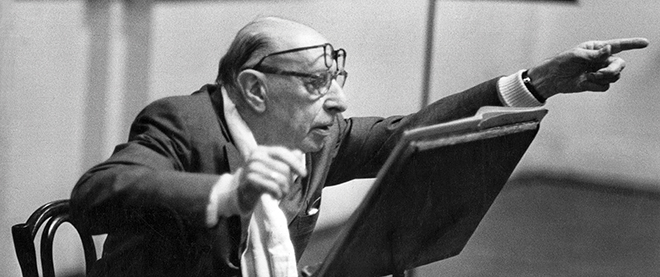Enough already with the ‘Rite of Spring’
Did one reportedly bloody night in Paris really change music forever?
Photo by Erich Auerbach/Getty Images
Share

It is the centennial of the premiere of Igor Stravinsky’s Rite of Spring, with all the accompanying fanfare, and the reek of hyperbole can make it hard for a sober person to read a concert program. Rite was, according to American conductor Marin Alsop, “the most complex music ever conceived.” “You can hear everything in it,” the Russian conductor Vladimir Jurowski said. Leonard Bernstein called it “the most important piece of music of the 20th century” and this retrospective sentiment of the instant masterpiece has gone down as smoothly and comfortingly as if Rite floated across the Atlantic like a digestive biscuit on the first merit-powered ocean crossing.
Really? We credit Rite for modernity when Pierrot lunaire, that atonal ditty by Schoenberg, premiered the previous year, and Webern’s 6 Pieces appeared four years earlier? Debussy’s wild Prélude à l’après-midi d’un faune was almost a decade old when Stravinsky wrote Rite, his third ballet score.
The riot probably has something to do with it, since it suited 20th-century ideas of artistic progress so nicely—the legendary Riteballet premiere on May 29, 1913, that was greeted with howls, supposedly ending with the audience bleeding on their tuxedos. It’s satisfying when the snobs break decorum and beat each other up over classical music, and revolutions are supposed to be violent, right? The writer Carl Van Vechten was there: “The young man seated behind me in the box stood up during the course of the ballet to enable himself to see more clearly. The intense excitement under which he was labouring betrayed itself presently when he began to beat rhythmically on the top of my head with his fists. My emotion was so great that I did not feel the blows for some time.” Many things cause emotion in the middle of a fistfight while dancers and orchestra struggle on, but what does this prove about the music? The riot was not even at a concert—it was at the ballet.
The night of the premiere, Sergei Diaghilev, founder of Ballets Russes, declared the scandal was “just what I wanted.” He’d warned the conductor to continue no matter what. And Parisians had lots to be angry about. They were irritated enough by the Russians that ensemble members were instructed to wear Western clothes outside, and the Théâtre des Champs-Elysées was still resented for its “German” architecture and foreign programming.
Vaslav Nijinsky’s choreography, with Nicholas Roerich’s slumping peasant costumes, was an “anti-ballet” of stomping vulgarity against the elegant conventions of Romantic dance, the true shock of the night. Stravinsky’s Firebird, Petrushka and Rite would not have existed without the ballet, and neither would their emphasis on rhythm and preference for unresolved tension over harmony, the characteristics usually cited for Rite’s musical influence. The ballet was performed only nine more times before Nijinsky was tossed out by Diaghilev. He went mad, never worked again, and died at 60. Stravinsky worked very hard and declaimed such modesties as “I am the vessel through which the Rite passed” until his death at 88.
It’s telling that the reception was different at Rite’s concert premiere at the Casino de Paris on April 5, 1914. No riot. Just Stravinsky carried through the streets. Had so much changed in a year? Probably Rite’s reputation had preceded it and the audience had self-selected. Or perhaps we have spent a century minimizing the shocking effects of the dancing in favour of a fairy tale about the music.
Rite took time and effort to become important—34 years just for Stravinsky to stop editing it, always away from the theatre and toward the concert hall. One scandalous premiere was never enough, as if music innovates in “breakthroughs” like a semiconductor laboratory. The myth of the premiere has replaced something richer: the incestuous society of music, the efforts of people for new music before and since. Music isn’t injured by acknowledging the importance of luck, influential teachers and friends, vain patrons, greedy impresarios, mistakes, and occasional dependence on other arts, like dance, but for some reason we don’t like to talk about that, preferring to pretend the history of music is just a history of merit.